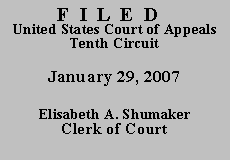 UNITED STATES COURT OF APPEALS
UNITED STATES COURT OF APPEALS
 UNITED STATES COURT OF APPEALS
UNITED STATES COURT OF APPEALS
| UNITED STATES OF AMERICA, |
|
| v. | |
| JESUS BALDERAMA-MENDEZ,
Defendant - Appellant. |
|
Before HENRY, TYMKOVICH, and HOLMES, Circuit Judges.(2)
I.
The United States Border Patrol apprehended Mr. Balderama-Mendez during a traffic stop near Carlsbad, New Mexico. When questioned by border patrol agents, Mr. Balderama-Mendez admitted he was a Mexican citizen and illegally entered the United States. A records check subsequently revealed Mr. Balderama-Mendez was deported on August 14, 2001 due to a prior felony conviction for aggravated battery.
Mr. Balderama-Mendez pleaded guilty, without a plea agreement, to one count of unlawful reentry by a deported alien previously convicted for an aggravated felony, in violation of 8 U.S.C. § 1326(a) and (b)(2). The United States Probation Office prepared a Presentence Report (PSR). Pursuant to § 2L1.2 of the United States Sentencing Guidelines (U.S.S.G.), Mr. Balderama-Mendez's base offense level was eight. The PSR recommended a sixteen-level enhancement based on the prior conviction for aggravated battery. See U.S.S.G. § 2L1.2(b)(1). A three-level reduction for acceptance of responsibility under U.S.S.G. § 3E1.1 brought Mr. Balderama-Mendez's final offense level to twenty-one. The PSR assessed a total of nine criminal history points against Mr. Balderama-Mendez under U.S.S.G. § 4A1.1: three points for his aggravated battery conviction under § 4A1.1(a); two points for a misdemeanor battery conviction under § 4A1.1(b); and the maximum of four points for five other misdemeanor convictions under § 4A1.1(c). In addition, Mr. Balderama-Mendez received zero points for a burglary conviction, a battery conviction, and four DUI convictions because they occurred more than ten years before the border patrol apprehended him. See U.S.S.G. § 4A1.2(e)(3). In accordance with the sentencing guidelines, nine criminal history points placed Mr. Balderama-Mendez in criminal history category IV. U.S.S.G. Ch. 5, Pt. A (Sentencing Table). An adjusted offense level of twenty-one and a criminal history category of IV yielded a suggested sentencing range of 57 to 71 months.
At sentencing, Mr. Balderama-Mendez did not object to the PSR or request a downward departure. Rather, he asked for a sentence at the lower-end of the advisory guidelines range. The district court obliged and sentenced Mr. Balderama-Mendez to 57 months' imprisonment.
Mr. Balderama-Mendez subsequently directed his defense counsel to appeal the district court's calculation of his offense level and criminal history category under the sentencing guidelines. Counsel filed a motion to withdraw and an Anders brief, asserting that there are no non-frivolous issues for appeal.
II. Under Anders v. California, counsel may request permission to withdraw from an appeal if counsel conscientiously examines the case and determines that there are no non-frivolous issues for appeal. 386 U.S. at 744. Counsel must in addition submit to both the court and his client a brief referring to anything in the record arguably supporting an appeal. The client may then raise any points he chooses, and the appellate court thereafter undertakes an independent examination of the proceedings and determines whether the appeal is in fact wholly frivolous. If it so finds, the appellate court may grant counsel's request to withdraw and dismiss the appeal. If, however, the court determines there are meritorious grounds for appeal in the record, the court must appoint the defendant new counsel to argue the appeal. Id.
As indicated above, the Anders brief of Mr. Balderama-Mendez's counsel states that there are no non-frivolous issues for appeal. Mr. Balderama-Mendez, despite being advised of his right to file a pro se supplemental brief, has chosen not to provide any additional materials to the court.
After a deliberate review of the record, we agree with defense counsel that there are no non-frivolous appealable issues. To begin, Mr. Balderama-Mendez pleaded guilty to illegal reentry and there is no evidence in the record that his plea was made unknowingly or involuntarily. In addition, there are no errors in the district court's calculations of Mr. Balderama-Mendez's offense level and criminal history category. We also note that Mr. Balderama-Mendez failed to object to those calculations below and received the exact sentence he requested at the sentencing hearing. Finally, we cannot detect any basis in the record for ignoring the presumption of reasonableness afforded to Mr. Balderama-Mendez's lower-end guidelines sentence. See United States v. Kristl, 437 F.3d 1050, 1054 (10th Cir. 2006).
III.
For the foregoing reasons, we GRANT counsel's motion to withdraw and DISMISS this appeal.
Entered for the Court,
Robert H. Henry
Circuit Judge
*. This order and judgment is not binding precedent except under the doctrines of law of the case, res judicata and collateral estoppel. It may be cited, however, for its persuasive value consistent with Fed. R. App. P. 32.1 and 10th Cir. R. 32.1.
2.After examining the briefs and appellate record, this panel has determined unanimously that oral argument would not materially assist the determination of this appeal. See Fed. R. App. P. 34(a)(2); 10th Cir. R. 34.1(G). The case is therefore ordered submitted without oral argument.